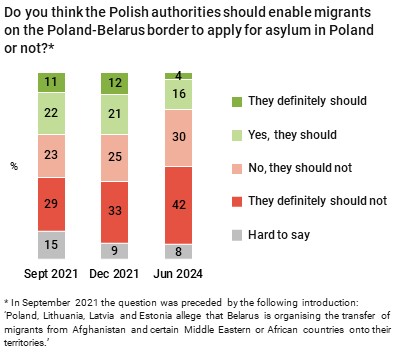14/2024
2024-07-11
Attitudes towards Migrants on the Belarus Border Worsen
Polish media are again giving increased coverage to tensions on the Poland-Belarus border. In recent weeks attempts to cross this border illegally have become more violent, leading to the death of a young Polish soldier. While this crisis has certainly intensified recently, it has actually been ongoing since 2021, the time of the first CBOS survey into attitudes towards the people arriving at the Poland-Belarus border. Right from the start Poles tended to be averse to giving them the opportunity to apply for asylum in this country (in December 2021 58% of respondents were opposed to this, while 33% were in favour). Currently attitudes have hardened, with a clear majority saying there should be no chance for migrants on this border to apply for asylum in Poland (72%) with only one in five (20%) holding the opposite view.

|
The minority in favour of allowing migrants access to the asylum process are more often to be found in larger towns and in households with a higher per capita income; they are better educated and more likely to have left-wing views. This is reflected in differences between the electorates of the various political parties: people voting for the Left or the Civic Coalition tend to be better disposed towards migrants than the average.
More on this subject in the CBOS report.
This ‘Current Events and Problems’ survey (410) was conducted using a mixed-mode procedure on a representative sample of named adult residents of Poland, randomly selected from the National Identity Number (PESEL) register. Respondents independently selected one of the following methods: Computer Assisted Personal Interview (CAPI); Computer Assisted Telephone Interview (CATI), respondents receiving researchers’ telephone numbers in an introductory letter from CBOS; Computer Assisted Web Interview (CAWI), where respondents filled in the online questionnaire independently, gaining access by means of a login and password provided in an introductory letter from CBOS. In all three cases the questionnaire had the same structure and comprised the same questions. The survey was carried out between 10 – 20 June 2024 inclusive on a sample of 1055 people (64.7% using the CAPI method, 21.4% CATI and 13.8% CAWI). CBOS has been conducting statutory research using the above procedure since May 2020, stating in each case the percentage of personal, telephone and internet interviews.





